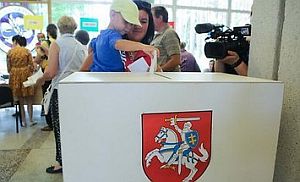EU – Baltic States, Legislation, Lithuania, Society
International Internet Magazine. Baltic States news & analytics
Thursday, 08.05.2025, 05:43
Lithuania elected 11 European Parliament members
 Print version
Print version |
|---|
After calculating votes from 1,515 polling districts, according to the preliminary data, the Social Democratic Party will be represented by Vilija Blinkeviciute and Zigmantas Balcytis, the Order and Justice Party by Rolandas Paksas and Valentinas Mazuronis, the Labour Party by Viktor Uspaskikh and Vydas Gedvilas, the conservatives by Gabrielius Landsbergis and Laima Andrikiene, the Liberals' Movement by Antanas Guoga, the Electoral Action of Poles in Lithuania (LLRA) by Valdemar Tomasevski, and the Lithuanian Peasant and Greens Union by Ramunas Karbauskis.
According to Chairman of the Central Electoral Commission (VRK) Zenonas Vaigauskas, the list may change once results from all 2,004 polling districts come in.
Lithuania will have 11 seats in the Parliament. In 2004, Lithuania elected 13 MEPs, in 2009 – 12 MEPs. The reduction in the number is associated with Croatia's accession to the EU and changes in population.
9 political parties have competed in the European Parliament election: the Liberals' Movement, the Homeland Union – Lithuanian Christian Democrats, the Labour Party, the Order and Justice Party, the Lithuanian Green Party, the National Union, the Liberal and Centre Union, the Lithuanian Peasant and Greens Union, the Lithuanian Social Democratic Party, and the only coalition entitled Valdemar Tomasevski's Block, consisting of the Electoral Action of Poles in Lithuania and the Russian Alliance.
There were 216 candidates who sought to be elected to the European Parliament.
Candidates of the party or a joint list of candidates may receive mandates of members of the European Parliament only if no less than 5 percent of the voters participating in the elections voted for it.
The Central Electoral Commission will announce the final results of the presidential and the European Parliament elections in a week after the election.
On 1-3 July, the new European Parliament will gather for the first time; then the President of the EP and 14 Vice-Presidents will be elected.
On 14-17 July, the new President of the European Commission should be announced.








 «The Baltic Course» Is Sold and Stays in Business!
«The Baltic Course» Is Sold and Stays in Business!

